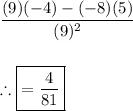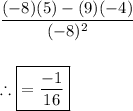Answer:
(A) -76
(B) 4/81
(C) -1/16
(D) 3
Explanation:
It is given that u and v are functions of x and are differentiable at x=0 and that u(0) = -8, u'(0) = -4, v(0) = 9, and v'(0) = 5. We are asked to find the following derivatives at x=0.
(A) -
![(d)/(dx)[uv]](https://img.qammunity.org/2024/formulas/mathematics/college/uzv3jkzrdn1ar9a37b41cfk461lxg9dul3.png)
(B) -
![(d)/(dx)\Big[(u)/(v) \Big]](https://img.qammunity.org/2024/formulas/mathematics/college/fwcgrb6dya2pphq67o15wsfvyu4bcjnm06.png)
(C) -
![(d)/(dx)\Big[(v)/(u) \Big]](https://img.qammunity.org/2024/formulas/mathematics/college/5dd8and23l8dsci6p75ohf4f1gbevmcrxa.png)
(D) -
![(d)/(dx) [-5v-7u]](https://img.qammunity.org/2024/formulas/mathematics/college/yzzbqvoydauyxh115rye2rcy88urud9rkn.png)

Part (A) - Using the product rule.
![(d)/(dx)[uv]=uv'+vu'](https://img.qammunity.org/2024/formulas/mathematics/college/iv5luig1y0y15zl7selutt3pdl69b2aq4n.png)
Substituting in our values:

Part (B) - Using the quotient rule.
![(d)/(dx)\Big[(u)/(v) \Big]=(vu'-uv')/(v^2)](https://img.qammunity.org/2024/formulas/mathematics/college/a5elsbdlev9mhzw4x904xxgmojz4tb1dov.png)
Evaluating at x=0:

Part (C) - Using the quotient rule.
![(d)/(dx)\Big[(v)/(u) \Big]=(uv'-vu')/(u^2)](https://img.qammunity.org/2024/formulas/mathematics/college/381jn12hlxk5kgmspry1yn3kfgzq5wd330.png)
Evaluating at x=0:

Part (D) - Deriving the function.
![(d)/(dx) [-5v-7u]=-5v'-7u'](https://img.qammunity.org/2024/formulas/mathematics/college/vccovy3kzrjuanpomzwg9m0dey45hxyh2v.png)
Substituting in our values:

Thus, all parts have been solved.